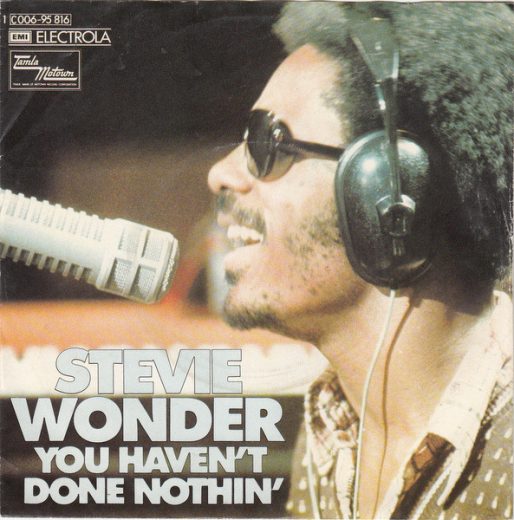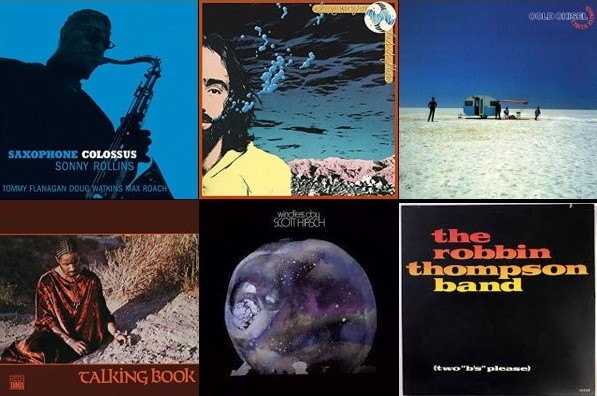Happy Wednesday and welcome to another installment of Song Musings where I take a closer look at tunes I’ve only mentioned in passing or not covered at all to date. Today, I’m happy to explore You Haven’t Done Nothin’ by Stevie Wonder, one of my longtime favorite artists.
Written by Wonder, You Haven’t Done Nothin’ first appeared on his 17th studio album Fulfillingness’ First Finale, which came out on July 22, 1974. It also was released separately on August 7 as the record’s first single.
The funky song featured background vocals by The Jackson 5 who prompted by Wonder sang the “Doo da wops” in the chorus. The politically aware tune became Wonder’s fourth no. 1 hit in the U.S. on the Billboard Hot 100 and his tenth to top the Hot Soul Singles, which today is known as the Hot R&B/Hip-Hop Songs.
Except for the bass, which was supplied by Reggie McBride, Wonder played all instruments on the recording, including Hohner Clavinet, hi-hats, crash cymbal, keyboard horns and drum programming. The use of the Hohner Clavinet is reminiscent of Superstition, one of Wonder’s signature tunes that had come out in October 1972. Here’s a great live version. Doo da wop, baby!
Fulfillingness’ First Finale is the fourth of five albums of Wonder’s so-called classic period, which arguably marked the high point of his career. In contrast to the predecessor Innervisions, which was focused on social consciousness, Fulfillingness’ First Finale overall projected a more reflective, personal and decidedly somber tone.
Fulfillingness’ First Finale was Wonder’s second album to hit no. 1 on the Billboard 200 and his third in a row to top the Soul LPs chart, which today is called Top R&B/Hip-Hop Albums. It yielded Wonder his second prestigious Album of the Year in a row and two other Grammys in March 1975 at the 17th Annual Grammy Awards.
Following are some additional tidbits from Songfacts:
This song is an angry, acidic attack on US President Richard Nixon, who two weeks after the release of Fufillingness’ First Finale resigned over the Watergate scandal and left the White House in disgrace. Shortly after Nixon’s resignation, Wonder issued this statement: “Everybody promises you everything but in the end, nothing comes out of it. I don’t vote for anybody until after they have really done something that I know about. I want to see them do something first. The only trouble is that you always hear the president or people say that they are doing all they can. And they feed you with hopes for years and years. I’m sick and tired of listening to all their lies.”
Wonder recorded this song at The Record Plant in Los Angeles. Around this time, he would keep a studio booked if he was in the New York or Los Angeles area, and work when inspiration struck, which could come at very odd times since he wasn’t controlled by daylight.
…Robert Margouleff and Malcolm Cecil, who guided Wonder’s work at the time, were the engineers and associate producers on the album. Margouleff recalls Michael Jackson showing up with a tutor, and a party atmosphere when the Jackson 5 did their vocals. “Everyone was so blown away with the harmonies they did,” he said.
…1974 was a strange and turbulent year in America, with the Watergate scandal dominating headlines, but riots in Boston and the acquittal of Ohio National Guardsmen who shot students at Kent State University also making news. This song reflected the outrage and anger many Americans were feeling. It was not just a #1 R&B hit, but also topped the Hot 100, the only politically charged song to do so that year. Other #1s that year were far more lightweight lyrically. They include “Seasons In The Sun,” “Kung Fu Fighting” and “(You’re) Having My Baby.”
There is some serious lyrical dissonance in this song, as the biting lyrics are accompanied by upbeat music. Wonder explained: “The best way to get an important and heavy message across is to wrap it up nicely. It’s better to try and level out the weight of the lyrics by making the melody lighter. After all, people want to be entertained, which is all right with me. So if you have a catchy melody instead of making the whole song sound like a lesson, people are more likely to play the tune. They can dance to it and still listen to the lyrics and hopefully think about them.”
The Who singer Roger Daltrey covered this for his 2018 solo album As Long As I Have You. [I reviewed the album here at the time – CMM] Daltrey told Billboard that recording the song gave him an opportunity to express his frustrations with the state of the world.
“It felt right for where we are politically around the world at the moment,” he explained, “because there’s so much frustration with the state of our nations and the politics. There’s an incredible anger out there, and all it is anger. It seems to be very unfocused. It just feels like we don’t seem to be moving on from where we are in the ’70s, when that song was written, so I sang it with a little more anger than I think Stevie ever sang it. But the lyrics apply just as much today as they did then.”
The title is a pretty egregious double negative, literally meaning you have done something, the opposite of what’s intended. “You Haven’t Done Anything” would be correct.
It’s far from the first hit song that’s a double negative: “(I Can’t Get No) Satisfaction” is a classic example.
Sources: Wikipedia; Songfacts; YouTube






